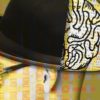Alcohol reduces our ability to assess facial symmetry in others, according to University of Roehampton researchers who say the effect is most pronounced in women. The findings, appearing in the journal Addiction, provide new insights into the infamous beer goggles effect. Facial symmetry (where one side of the face mirrors the other) is generally thought […]









